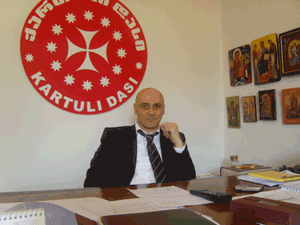Nona Salaghaia
Would Law Enforcers Be Charged?
 An idea of making corridors of shame was appreciated by Georgian law enforcers. They liked the idea so much that they began to arrange corridors of shame at police stations. Today corridors are arranged for those people who made them for others at the buildings of Public Broadcasting and Parliament.
An idea of making corridors of shame was appreciated by Georgian law enforcers. They liked the idea so much that they began to arrange corridors of shame at police stations. Today corridors are arranged for those people who made them for others at the buildings of Public Broadcasting and Parliament.
According to Shako Esadze, a member of youth movement “Why”, after detention of opposition supporters, they were taken to detention setting. There were policemen standing in two lines at the entrance of the setting and they made the detainees to go through the corridor of shame. “They assaulted us verbally and beat us with truncheons; the policemen said they were taking revenge on us for arranging the corridors,” said Esadze. He was participating in the protest rally on June 15 at the Main Tbilisi Police Department and was detained with other activists for the reason of the resistance against policemen during the dispersion of the rally.
According to Giorgi Sikharulidze from the Youth Organization, “some policemen were “generous” and some “cruel”. We were about 30 people detained from opposition parties; the policemen beat those people who were already assaulted; part of law enforcers beat us and another part encouraged the others to be more violent. After going through the corridor of shame they took me to the reception-room where I saw other detainees too. According to official information, the policemen detained 39 people, but I am sure there were much more detainees. They continued beating and assaulting us and spitting us even in the reception-room. They took us to the detention setting where nobody assaulted us anymore. An inspector could not write detention protocol but suggested me to read books rather than being a revolutionist,” said Giorgi Sikharulidze.
At the moment six people are still in the detention setting who were arrested for the incident on June 15. Their colleagues have been concerned about the health conditions of the detainees and requested their medical examination. In addition to that, the detainees started hunger-strike. Irakli Kordzaia, journalist and activist of the political movement, reported to the Human Rights Center that the hunger-strike is very dangerous for the detainees who already have poor health. Parliament of Georgia reacted on their protest and MPs Rusudan Kervalishvili and Jondi Baghaturia entered the detention setting to see the detainees personally. It happened on June 23 - 8 days after the activists were arrested.
The MPs made statement after leaving the detention setting. They said two detainees Dachi Tsaguria and Misha Meskhi should be medically treated. Jondi Baghaturia said the detainees did not have any injuries but Misha Meskhi and Dachi Tsaguria should be examined by doctors.
“They look brave and do not feel desperate. 8 out of 19 detainees were beaten; however much time has passed since they were arrested and no injuries can be observed on their bodies now. Only Dachi Tsaguria has some injuries on his hand. It is quite possible that they have some problems that cannot be without medical examination. I think doctors should examine then,” said Baghaturia.
The MP added that the health conditions of the detainees are satisfactory; they are under observation of doctors and they are provided with medicines if it is necessary. Baghaturia said they started hunger-strike to protest the action of the government and not the law enforcers.
“They told me before policemen brought them to the detention setting, they were physically assaulted and were made to pass through the so-called corridor of shame,” said Jondi Baghaturia.
“When the detainees were placed in the detention setting they were examined by doctors and corresponding protocol was drawn up. The document describes what injuries they had when entering the detention setting. The prison administration did not accept them without checking. The Ministry of Internal Affairs will not be able to deny that policemen had assaulted the detainees. By the way, the names of the policemen, who brought the boys to the detention setting, are also written in the protocol. Consequently, those policemen will be charged and it will not be difficult to find them,” said the MP.



